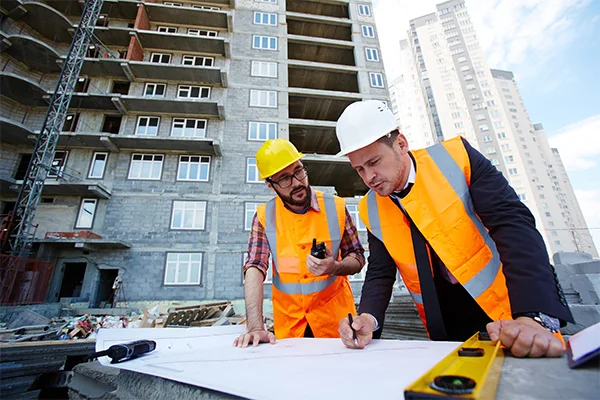Whether you are building a new home or just renovating your old one, you need a group of people who can handle all the work for you. And that’s why building contractors come to the project. As we all know, the construction industry is vital and involves many tasks to complete a single project. Hence, different types of contractors are in the construction sector to deal with the different tasks. So, you must know about the types of contractors to complete your construction project successfully without facing any hassle.
Hence, Brick&Bolt gives detailed info about the different types of building contractors involved in the construction project so that you can choose your home contractor wisely and take advantage of their skills and potential.
So, let’s start with understanding what a contractor is and its importance in the construction project.
What is a Contractor and its Importance?
A contractor is an individual or company that is hired to perform a particular task for their client. In the construction industry, building contractors are crucial to successfully completing the project. A contractor’s major responsibility is to manage their team of workers and make sure that all work is performed on a timeline and within budget. To perform this duty, contractors must have excellent organisational abilities, along with well-versed knowledge of building codes and safety standards. Apart from these, contractors must have strong technical and communication skills because their duty requires effective communication with the clients, team members, workers, suppliers, etc.
11 Types of Home Contractors in Construction
The following are the different types of contractors:
- General Contractors
- Design-Build Contractors
- Residential Contractors
- Commercial Contractors
- Civil Contractors
- Electrical Contractors
- Plumbing Contractors
- HVAC Contractors
- Painting Contractors
- Flooring Contractors
- Carpenters
Let’s dive deep into all types of home contractors –
1. General Contractors
General contractors are not experts in just one field. They oversee teams of different types of contractors working on both commercial and residential construction projects throughout large constructions. They have significant building skills, so they supervise a broad range of work and ensure that everything is completed on time and efficiently.
In simple words, general contractors are the project managers who hire all the suppliers and subcontractors or specialist contractors like electrical, plumbers, carpenters, etc., for the successful completion of the project. They are accountable for providing all of the required materials, labourers, equipment and services for the completion of the project.
2. Design-Build Contractors
Design-build contractors perform a double duty. They hire to make a building design that meets your requirements and then execute the plans. It contrasts with the typical construction process, in which a consultant is recruited first to make a plan before giving it to a contractor or home builder to build according to the plan.
A design-build contractor is responsible for designing the plan, recruiting subcontractors or specialist contractors, and supervising and managing the construction process to make sure that it matches the client’s requirements.
3. Residential Contractors

Residential contractors are those who specialise in home construction and renovation. They have a license and qualification to work on construction projects, and they, as a house builder, collaborate with homeowners, architects, and engineers to ensure a smooth and efficient construction process. Some home contractors specialise in renovation work, also known as home renovation contractors. These home renovation contractors are involved in all phases of home renovation
4. Commercial Contractors
As the name suggests, commercial contractors are those professionals who specialise in commercial construction, such as shopping centres, malls, office buildings, and other commercial projects. They frequently have to deal with multiple levels of legal requirements and have a team that specialises in various parts of commercial construction.
5. Civil Contractors
Civil contractors generally work on large infrastructure projects such as dams, bridges, highways, and water treatment plants. They frequently collaborate with civil engineers to make sure that the project is constructed according to the specifications.
6. Electrical Contractors
Electrical contractors are experts in electrical systems. Responsibilities of the electrical contractors are the installation, maintenance and repair of electrical systems like outlets, fire alarm systems, lighting, fans, etc., in residential, commercial and industrial projects.
While some electrical contractors work on smaller projects like adding outlets or installing light fixtures, others handle larger projects like upgrading service panels or doing complete wiring.
7. Plumbing Contractors
Plumbing contractors are responsible for the plumbing systems. In the residential project, they install utility closets, bathrooms, kitchens, break rooms, and backflow preventers, along with water supply pipes. They also install drains and connect them to existing septic tanks or sewer systems.
Apart from installation, they maintain and repair all the plumbing systems, such as fixing leakage, re-piping, unclogging pipes, repairing sewers, etc.
8. HVAC Contractors

HVAC subcontractors are responsible for installing, maintaining and repairing heating, ventilation, and air conditioning systems to keep your home comfortable. In simple words, they install both heating and cooling systems, such as air conditioning systems, heat exchangers, air handlers, and boilers.
For commercial projects, they might also handle refrigeration tasks for large cold storage warehouses, restaurants, and commercial projects.
9. Painting Contractors
Painting contractors are the most important for the finishing of the home as they give a fresh and attractive appearance to your home by painting it. You can customise the colours to give it a personal touch. They ensure the smooth finishing of your walls and ceilings.
10. Flooring Contractors
The flooring contractor is responsible for laying the well-finished floor throughout the project. They install tiles, vinyl flooring, hardwood, or carpet; however, each may demand its own speciality flooring subcontractor.
11. Carpenters
Carpenters are the experts in woodworking in home construction. They specialise in certain areas, such as furnishing, cabinetry, framing, crown moulding, etc.
Conclusion
In conclusion, the construction industry depends on the different types of contractors, each with a specific specialisation and skills. From the general contractors who supervise the entire project to specialist contractors, the right group of experts makes your construction project smooth and hassle-free. Hence, it’s crucial to understand the roles and responsibilities of these contractors, whether you are planning to build a home or any commercial project.
So, always make an informed decision while selecting the building contractors for your dream project because reputed contractors or construction companies like Brick&Bolt ensure your home is built with precision, efficiency, and prime quality. In addition, you can estimate the cost of your dream home using Brick&Bolt’s online home construction cost calculator.

